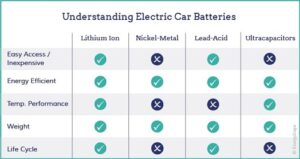Comparison of Different Battery Types for Electric Vehicles
Different Battery Types for Electric Vehicles
The primary barrier to electric vehicle adoption is the energy-storing capacity of batteries. A car’s driving range depends heavily on the type of battery used. Various types of batteries are being tested for use in electric vehicles. Lead-acid, nickel-cadmium, nickel-iron, zinc-air, and aluminum-air batteries are some of the most common. While the Nissan Leaf is the most advanced EV, its range is limited by its lithium-ion battery.
Unlike the conventional combustion-powered car, an electric vehicle can be powered by a battery pack. The choice of a battery pack can make a huge difference in a car’s range. The size and shape of an electric vehicle’s battery can impact its range. A pure electric vehicle can have a bigger battery than a hybrid. But the size and weight of each type are different.
When it comes to selecting an electric vehicle battery, there are a few important factors to consider. For example, the cost of each type should be considered. The cost of each type should also be considered. The best battery for an electric car will depend on the range and cost of the car’s operating costs. The higher the price, the better the battery. A good electric vehicle battery pack should provide enough energy to power the vehicle for several hundred miles.

Comparison of Different Battery Types for Electric Vehicles
The cost and energy density of each type will also influence the decision of which one is the best for an electric vehicle. For a pure electric vehicle, the best battery will be one that offers the most energy per unit weight. The smallest volume and weight would be optimal. Currently, lead-acid, nickel cadmium, and lithium-ion batteries are the most popular. Depending on the model and power requirements, the type of battery used may vary from one EV to the next.
The main differences between these two types of batteries for electric vehicles are price and cycle life. A car that uses a lead-acid battery will have a low-price and high-energy consumption. A nickel-metal-hydride battery will have higher energy density, but its price will be more expensive. However, a vehicle with a high cost and high-energy usage will have a lower price.
The type of battery will determine the cost and range of the vehicle. A car that uses lithium-ion batteries is lighter, cheaper, and more efficient than one that uses lead-acid batteries. A lithium-ion battery will last for several years. It will not be completely discharged, and will be a viable option for many electric cars. A NiMH battery will be a good choice for a high-power electric vehicle.